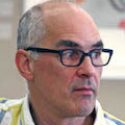Professors named to American Academy of Nursing

Kristine Kwekkeboom (left), professor of nursing, and Karen Solheim, clinical professor of nursing, have been selected as fellows by the American Academy of Nursing. Photo: Bryce Richter
Two University of Wisconsin–Madison School of Nursing professors are among 164 nurse leaders named to the 2016 American Academy of Nursing fellows class.
Kristine Kwekkeboom researches non-drug therapies to relieve symptoms in cancer patients and serves as the faculty director of the nursing doctorate program.
Karen Solheim, an expert in global health, is leading a sweeping curriculum redesign. Both will be honored at a ceremony during the academy’s annual policy conference Oct. 20-22 in Washington, D.C.
Kwekkeboom’s work focuses on strategies that nurses can use to help cancer patients manage or minimize pain and related symptoms. She said that this aspect of complementary medicine has grown in the past two decades and health teams are increasingly incorporating non-drug strategies to help patients cope with symptoms. Kwekkeboom sees her selection as “recognition of the importance of palliative care and the contribution of nurses to this important work.”
Solheim, who has been practicing nursing since 1973, joined the UW–Madison School of Nursing clinical faculty in 2007 and has served as director of the undergraduate program since 2015. She was instrumental in founding the school’s undergraduate immersion clinical programs in Malawi and Thailand and she’s been the school’s director of global health initiatives since 2014.
“We live in a very interconnected world, and we are always impacted by global issues and global health issues.”
– Karen Solheim
In her fellowship application, Solheim highlighted her dedication to and experience in global health.
“We live in a very interconnected world, and we are always impacted by global issues and global health issues,” she said. “Whether it’s the Zika virus or Syrian refugees seeking asylum in the United States, it affects us. As health-care providers, we can’t do our work without considering these things.”
The academy is composed of more than 2,400 nurse leaders in education, management, practice, policy, and research. Academy fellows include hospital and government administrators, college deans, and renowned scientific researchers.
They’re selected based on their contributions to nursing and health care and sponsorship by two current academy fellows. A panel of elected and appointed fellows look at how much each nominee’s nursing career has influenced health policies and the health and well-being of all.
“I am delighted to welcome this superb cohort of talented clinicians, researchers, policy leaders, educators and executives as they join the ranks of the nation’s leading nursing and health care thought leaders,” said academy President Bobbie Berkowitz. “We look forward to celebrating their accomplishments at our conference, and then working with them to advance the academy’s mission of transforming health policy and practice by applying our collective nursing knowledge.”
Tags: faculty, faculty awards, nursing, School of Nursing



